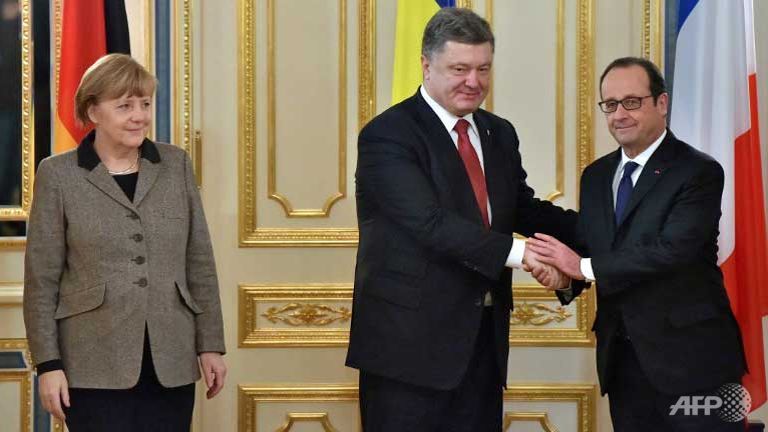French, German leaders in new Ukraine peace push
 Ukrainian President Petro Poroshenko (C) meets French President Francois Hollande (R) and German Chancellor Angela Merkel (L) in Kiev. (AFP/SERGEI SUPINSKY) |
KIEV: German Chancellor Angela Merkel and French President Francois Hollande made a surprise trip to Kiev Thursday (Feb 5) to propose a new peace plan that they will take to Moscow next, in a major diplomatic push to end the deadly fighting in eastern Ukraine.
The two European leaders, who will meet with Russian President Vladimir Putin on Friday, arrived in the Ukrainian capital hot on the heels of US Secretary of State John Kerry, who said that Moscow held the cards to ending the conflict.
The renewed efforts to halt the 10-month conflict came as Washington weighed sending arms for Kiev's fight with pro-Russian rebels following a surge in violence in recent weeks.
At least 21 people were killed in fresh clashes over the past 24 hours, as the separatists attempt to push deeper into government-held territory.
After meeting with his German and French counterparts, Ukrainian President Petro Poroshenko said the talks raised "hope for a ceasefire", his office said in a statement late Thursday.
Kerry threw Washington's weight behind the latest peace initiative, although Ukraine's premier said he was sceptical.
"President Putin can make the choices that could end this war," Kerry said after meeting Ukrainian leaders, voicing support for the "helpful" Franco-German plan to be put to the Russian leader on Friday.
"There must be an immediate commitment now to a real ceasefire, which is not just a piece of paper with words, but which is followed by specific actions," Kerry told journalists.
Kerry added that US President Barack Obama would "soon" decide on whether to arm Ukraine, but stressed his preference for a diplomatic solution.
'NO PROXY WAR'
"We are not interested in a proxy war, our objective is to change Russia's behaviour and we'll consider all options that are available to us in coordination with our partners that will help us achieve a negotiated solution," Kerry said.
Russia, accused by the West of arming the separatists, warned that any US move to send weapons to Ukraine would cause "colossal damage" to ties, foreign ministry spokesman Alexander Lukashevich said.
Kerry is to meet Russian Foreign Minister Sergei Lavrov at a security conference in Munich on Saturday, ahead of Obama holding a "very important" meeting with Merkel at the White House on Monday, Kerry said.
The new plan offers greater autonomy within Ukraine for the separatists, and across a larger area than agreed at the last truce deal in Minsk in September, Germany's Sueddeutsche Zeitung said.
Poroshenko had to understand this was his country's last chance to avoid military defeat and economic collapse, while Putin was warned to count on fresh European Union sanctions, the paper said, citing unnamed sources.
A spokesman for the German government however dismissed the newspaper report as "not accurate".
NATO BOLSTERS DEFENCE
Speaking in Paris before his unexpected trip to Kiev, Hollande said he and Merkel would "propose a new solution to the conflict based on the territorial integrity of Ukraine".
He said the plan would be discussed with both Poroshenko and Putin, but he warned that diplomacy "cannot go on indefinitely".
Despite the diplomatic momentum behind the new plan, Ukrainian Prime Minister Arseniy Yatsenyuk insisted Moscow stick to a widely flouted truce accord agreed in Minsk last September.
"To have a new deal, not to execute the previous one, seems to me a trap," Yatsenyuk told journalists.
"We urge Russia to implement and execute what was agreed, signed personally by president Putin."
In Brussels, NATO agreed a major boost to the alliance's defences near its Russian borders, including six command centres and a quick-reaction spearhead force of 5,000 troops.
The fighting in Ukraine has claimed more than 5,350 lives since April, including some 220 in just the past three weeks, according to the United Nations.
Renewed attempts at peace talks in the Belarussian capital Minsk over the weekend collapsed after rebel leaders stayed away.
NATO Secretary General Jens Stoltenberg said that the move to boost troops in eastern Europe was in response to Moscow's "aggressive actions," but nevertheless purely defensive.
In a move that is likely to irk Moscow, NATO announced six "command and control" units in eastern European nations to ensure that the new force could hit the ground running.
CIVILIANS DEATH RISE
In the rebel bastion of Donetsk, shelling killed eight civilians and wounded 33 more over the previous 24 hours, the insurgent-controlled city hall said.
Kiev-loyal authorities said six civilians had been killed around Donetsk, and military spokesman Vladyslav Seleznyov said that heavy shelling killed five Ukrainian soldiers and wounded 29 around the region.
Another two civilians died in the battleground railway hub of Debaltseve, which rebels are trying to encircle and capture, Kiev officials said.
What the stars mean:
★ Poor ★ ★ Promising ★★★ Good ★★★★ Very good ★★★★★ Exceptional
Latest News
More News
- Russian President congratulates Vietnamese Party leader during phone talks (January 25, 2026 | 09:58)
- Worldwide congratulations underscore confidence in Vietnam’s 14th Party Congress (January 23, 2026 | 09:02)
- Political parties, organisations, int’l friends send congratulations to 14th National Party Congress (January 22, 2026 | 09:33)
- 14th National Party Congress: Japanese media highlight Vietnam’s growth targets (January 21, 2026 | 09:46)
- 14th National Party Congress: Driving force for Vietnam to continue renewal, innovation, breakthroughs (January 21, 2026 | 09:42)
- Vietnam remains spiritual support for progressive forces: Colombian party leader (January 21, 2026 | 08:00)
- Int'l media provides large coverage of 14th National Party Congress's first working day (January 20, 2026 | 09:09)
- Vietnamese firms win top honours at ASEAN Digital Awards (January 16, 2026 | 16:45)
- ASEAN Digital Ministers' Meeting opens in Hanoi (January 15, 2026 | 15:33)
- ASEAN economies move up the global chip value chain (December 09, 2025 | 13:32)
















 Mobile Version
Mobile Version